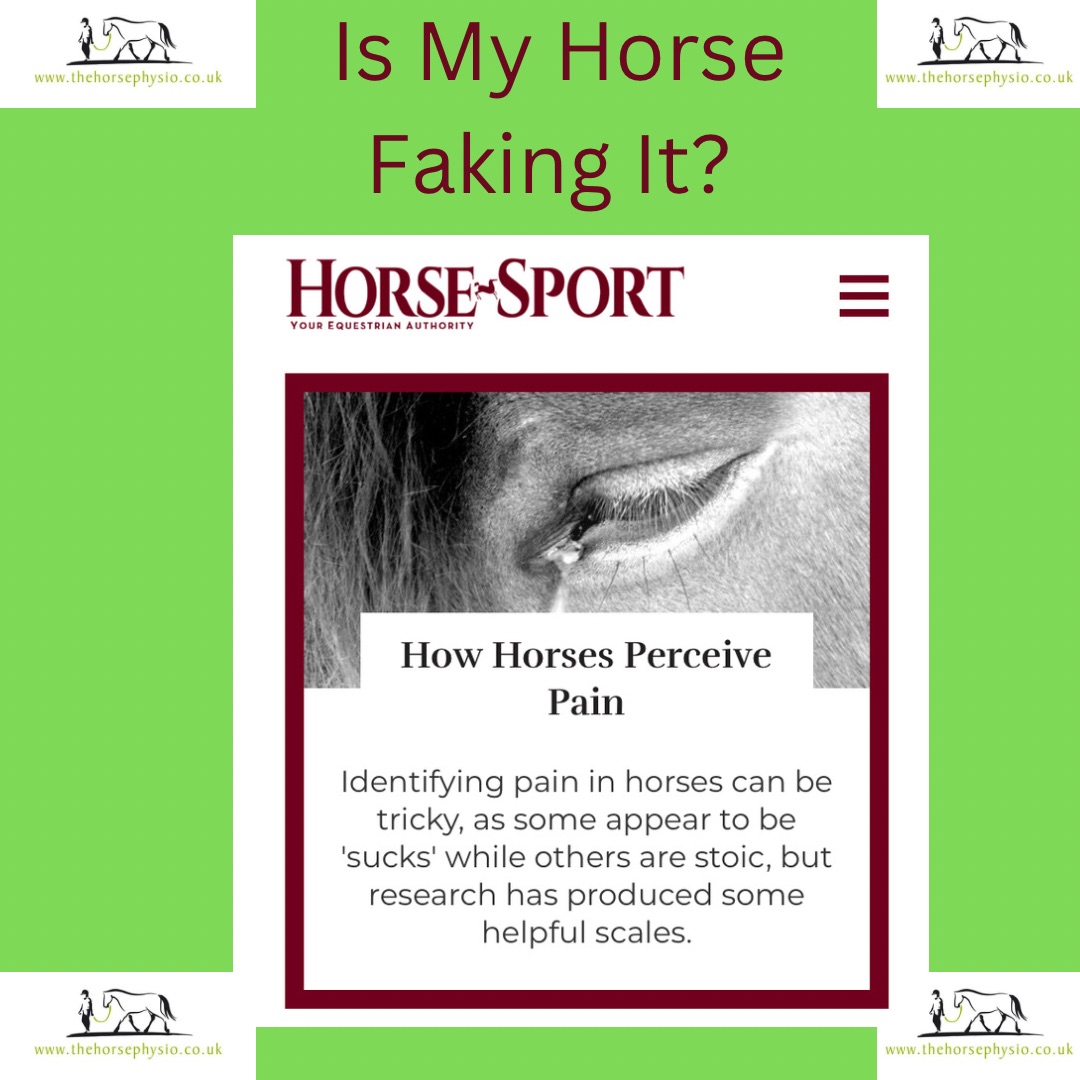You can listen to this short clip here, and find The Horse Physio on Facebook, YouTube, and Instagram. Please like and subscribe on the channels you enjoy most, and also take a minute to sign up to my newsletter.
Here is a quote from an article by HorseSport titled ‘How Horses Perceive Pain’, which I hope answers the question for you of ‘Is my horse faking it?’:
“Being more sensitive to pain than another horse is not a character flaw, but a real and lived experience. Indeed, there is no logical reason for a horse to exaggerate their pain. In fact, quite the opposite is true. Horses, as prey animals, are evolutionarily designed to minimise their suffering and make accommodations to mask their lameness. Horses who showed their weakness were more likely to be tonight’s dinner for the next predator, and thus have no opportunity to pass those wimpy genes on to their offspring and to future generations.”
The article discusses how we might recognise pain in our horse, in particular through using the Horse Grimace Scale and / or the Ridden Horse Pain Ethogram. It fascinates me how many people are confident that they would know if their horse was hurting, and yet the evidence is clear that the vast majority of us do not.
Working as an ACPAT and RAMP registered Chartered Physiotherapist, one of the first things I ask a new client is ‘What would you like from me?’. Commonly, the answer is ‘I want to know that my horse is not in any pain.’ At least those of you who are not confident that they would recognise subtle signs of discomfort, know that there are professionals you can work with to reassure you, or to guide you in the right direction if further investigation is needed.
Of course, my answer is that it’s highly likely that there will be a degree of pain somewhere when I assess the horse. He is an athlete, and as such, he is placing demands on his body that are greater than those he would experience grazing. Probably, there will be something somewhere in his body that doesn’t function quite as it should, because no horse makes it through life without trauma of some kind, even if that trauma is simply being born, or falling over as a foal. If I did a full physio assessment on you, I’m confident that I would find some sore areas, some restrictions, some stiffnesses, and some muscle spasm. I would expect to find these in your horse, as well.
The point is, whether your horse is comfortable doing what’s asked of him, given whatever soreness, restriction, stiffness, and muscle spasm that he has going on. Are you comfortable doing what you do given the soreness, restriction, stiffness, and muscle spasm that you have going on? My brother competes in triathlons and Ironman competitions. I know for sure that he is not ‘comfortable’ throughout his training and competitions. But he weighs up the pain that he endures, against the benefits that he feels, and he chooses to compete. I’m not such an athletic type, and I weigh up the pain I feel running even 1 km, against the benefits that I gain, and for now at least, I decide against the running.
Each horse is an individual, and responds in his own way to any pain that he might experience. Some will keep going no matter what, or so it seems, and others appear to throw the towel before they even get started. But it’s not up to us to judge how the horse reacts. It is up to us to recognise when there is a problem, to do our best to find the root cause, and to address it appropriately.
You can read the full article, ‘How Horses Perceive Pain’, atwww.horsesport.com.
Keep an eye out for my next book, “Harmonious Horsemanship: How to use the Ridden Horse Ethogram to Optimise Potential, Partnership, and Performance”. This ground-breaking book is co-authored with Dr Sue Dyson, and will be available summer 2023. Sign up at www.harmonioushorsemanship.co.uk to be kept up to date with new information as it comes available.
Watch a FREE 30-minute documentary on the Ridden Horse Ethogram here.
Here’s a FREE 30-minute presentation by Sue Palmer on how to be confident that your horse is comfortable.
Other books by Sue Palmer M.Sc. MCSP:
‘Horse Massage for Horse Owners’
‘Understanding Horse Performance: Brain, Pain or Training?’
© Sue Palmer, The Horse Physio, 2022
